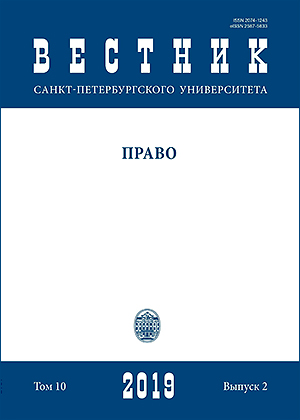Public-private partnership in higher education and science in Russia
DOI:
https://doi.org/10.21638/spbu14.2019.202Abstract
This article represents the first study of legal problems and the potential development of publicprivate partnerships (PPP) in science and higher education in Russia. The author considers PPP to be the most flexible and promising instrument for attracting private investments for such infrastructure, which support required enhancement of cooperation between scientific and educational institutions and real companies, and therefore facilitates achieving national goals and strategic tasks for the development of science in the Russian Federation. Compared to ordinary models of cooperation between the public and private sectors, this approach represents closer cooperation of scientific and educational potential of the public sector with investment, technology, and industrial resources from the private sector. At the same time, the government and universities themselves, competing for students and financing, more than ever require resources for infrastructure development. The author analyses advantages of PPP models for both the private and public sectors, general conditions for development of this mechanism in the country, and how public-private partnership in the traditional sense in higher education and science in Russia has better prospects than elsewhere, such as Great Britain, where higher education is private and in the best case partially financed from the public budget. Furthermore, the government does not play a considerable role in managing educational organizations and does not own its facilities. At the same time, considerable disbalances between needs of economic and innovative development of the country and the quality of PPP legislation is clearly noted, as well as particular legislative problems, and the author provies recommendations on how to improve laws.
Keywords:
public-private partnership, municipal-private partnership, PPP, concession, public-private partnership agreement, concession agreement, infrastructure project, higher education, science
Downloads
References
sphere”]. Rossiiskii ezhegodnik predprinimatel’skogo (kommercheskogo) prava [Russian Annual of Entrepreneurial(Commercial) Law] 5: 202–213. (In Russian)
Downloads
Published
How to Cite
Issue
Section
License
Articles of "Vestnik of Saint Petersburg University. Law" are open access distributed under the terms of the License Agreement with Saint Petersburg State University, which permits to the authors unrestricted distribution and self-archiving free of charge.






